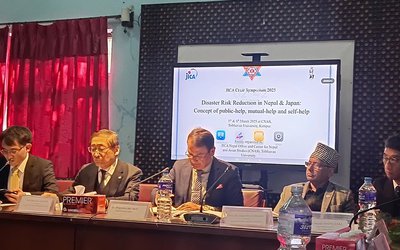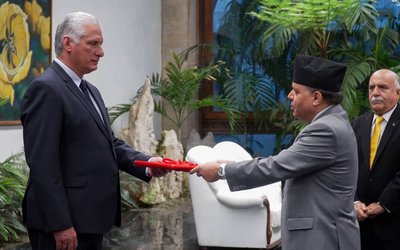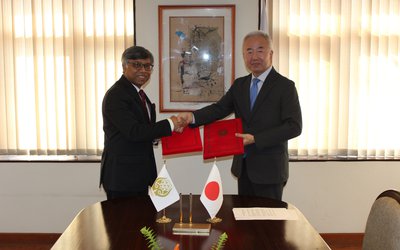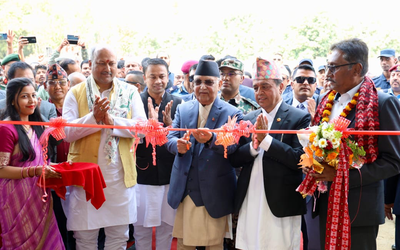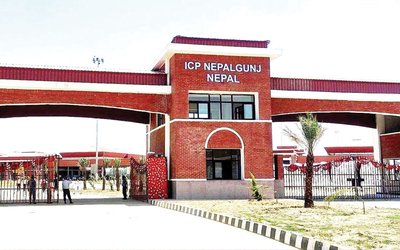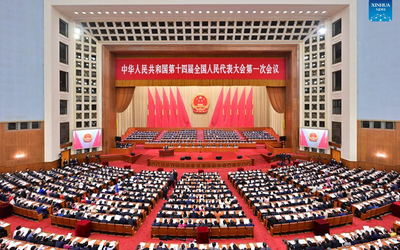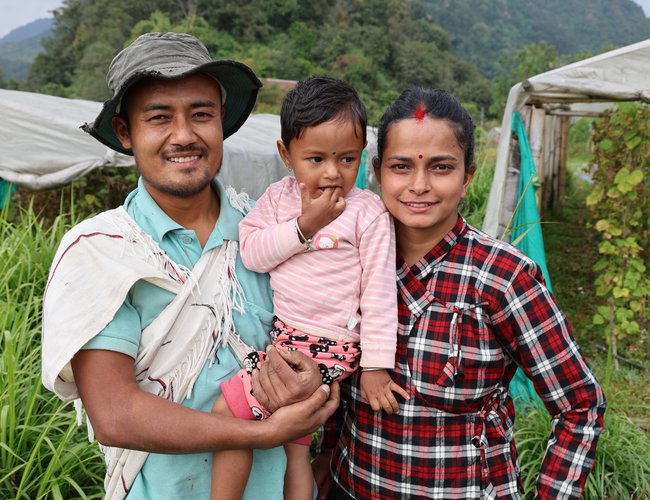
Bhojraj Tamang, a 28-year-old resident of Lahachwok in Machhapuchre Rural Municipality Ward No. 4, returned to Nepal in June 2019 after completing a year-long vocational training program in Israel under a learn and earn initiative.
Having saved approximately Rs. 900,000 (US$ 600,000) during his time in Israel and secured a loan of Rs. 500,000 (US$ 3,000) from the Lahachwok Small Farmer Cooperative, Tamang established Harmroghar Organic and Agriculture Farm, a crop and goat farming operation located at an elevation of 1,718 meters in Armala, specializing in off-season organic vegetables.
Together with his wife, Shanti Bhattarai Tamang, who also participated in Israel's Learn and Earn program, they faced significant challenges in obtaining additional funding to expand their farm.
Despite their efforts, when the Lahachwok Small Farmer Agriculture Cooperatives could not provide a loan of approximately three million, Tamang's attempts to secure financing from various commercial banks were unsuccessful due to insufficient collateral.
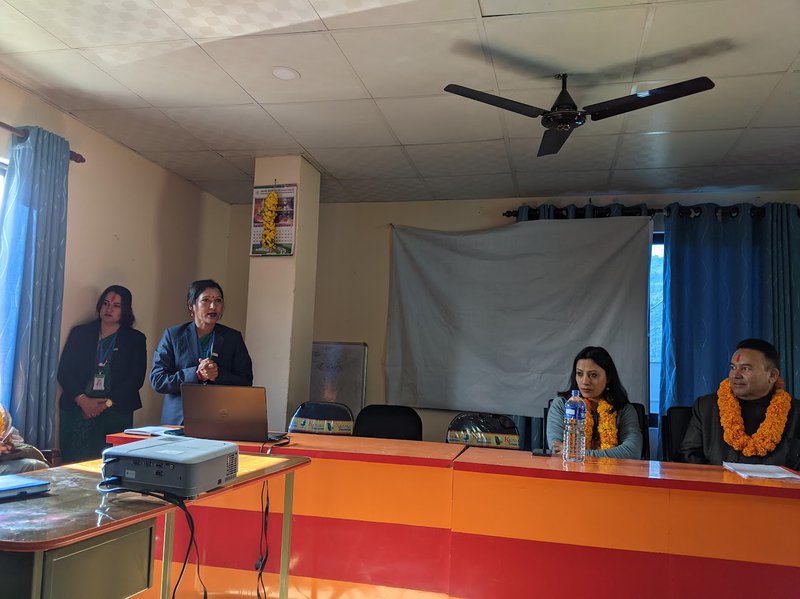
Tamang found himself in a state of frustration and disappointment, grappling with a difficult decision. Nevertheless, the introduction of the REFP program provided him with the necessary support to remain with his family and within his village.
With a concessional loan of 2.9 million from Lahachwok Small Farmer Agriculture Cooperatives Ltd, Tamang was able to enhance his agricultural operations by leasing additional land, constructing shelters for goats, and implementing sprinkler irrigation and tunnels across approximately 130 Ropani (18 acres). This transformation has rendered his farm a commercially viable venture.
"The skills and training I received in Israel, along with the loan from SFAC under the REFP, have enabled me to establish and commercialize my farming activities, allowing me to sell off-season vegetables and goats, generating an annual income of Rs. 5 million. I consistently pay my bank interest and have an annual profit of Rs. 2 million," Tamang stated, expressing his desire to acquire more land for further expansion. "I have sold cauliflower, cabbage, beans, and mustard greens for about Rs. 4 million, in addition to goats valued at Rs. 1 million," he added, noting that he also provides employment for five local youths. "I have no intention of seeking employment abroad."
Chandra Bahadur Shahi, the husband of Anita Sen Shahi and proprietor of Goma Agriculture Farm located in Lahachwok Ward No. 4 of Machhapuchre Rural Municipality in Kaski District, has come to the realization that commercial agriculture yields greater financial returns than foreign employment after nearly 13 years abroad, which included 6 years in Malaysia, 4 years in Dubai, and 3 years in Pokhara.
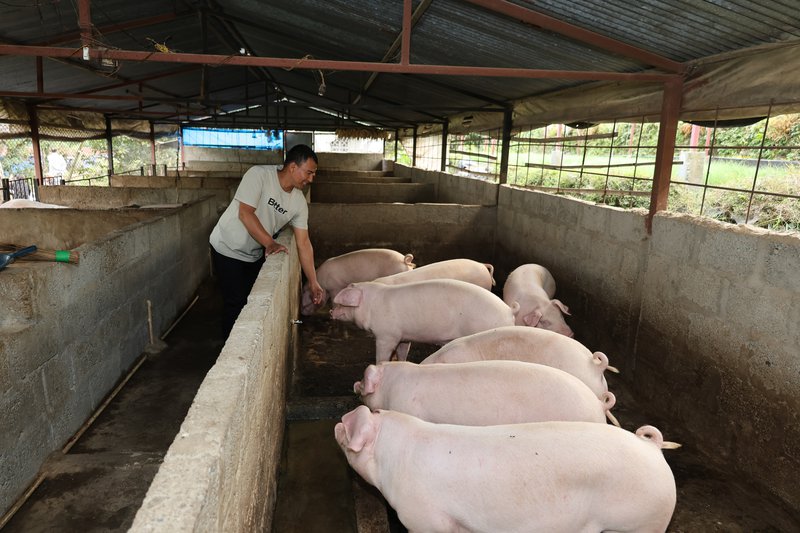
His wife, Anita Shahi, played a pivotal role by securing a concessional loan of Rs. 2.5 million from Lahachwok Small Farmer Agriculture Cooperative Ltd. This financial support has enabled Chandra Bahadur Shahi and his family to engage in the sale of milk and vegetables. Residing near the Pokhara valley alleviates concerns regarding product demand, as Shahi noted, "There is a significant demand for milk both here and in Pokhara. We receive cash payments. With an annual turnover of approximately 4 million, we generate around 2 million in profit." Additionally, he owns a tractor for transporting hay and plowing the fields.
Shahi's journey began in Malaysia in 2002, where he remained until 2008, before returning to operate a taxi in Pokhara. In 2014, he moved to Dubai, where he stayed for three years until the end of 2017. Utilizing the initial capital he brought back from Dubai, along with a small loan from the Small Farmer Agriculture Cooperative, his wife established a dairy farm with five buffaloes in 2019. The 2.5 million loan obtained under the REFP program has significantly transformed the Shahi family's quality of life.
Due to the limited availability of land for collateral, securing a seven-figure loan for agricultural commercialization is unfeasible. "If we had not obtained this loan, our living conditions would have remained as they were in the past," stated Shahi.
Birendra Thapa Magar, a returnee migrant from Majthana in Pokhara Metropolitan City, has successfully reintegrated into society. Thapa, who returned from Korea and acquired skills in pig farming, generates income by selling pigs in Pokhara and surrounding villages.
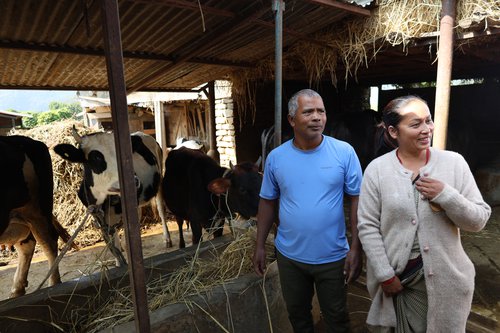
"The initiative supports small and marginalized farmers in remote areas of Nepal and enhances the capabilities of SFACL," remarked Dr. Shiva Ram Prasad Koirala. "Since a significant portion of our migrant workforce falls into this demographic, the project will also address their needs."
Initially, Thapa invested his modest savings along with a small loan of Rs. 500,000 from the Small Farmer Agriculture Cooperative. However, the additional funding he received through REFP has allowed him to envision his Sanvi Bahuudeshiya Krishi Farm as a commercial enterprise.
"Many returnee migrants possess skills, exposure, and some savings, yet these resources are insufficient for commercial farming. A program like REFP is essential to retain and reintegrate returnee migrants into the agricultural sector and enhance production," Thapa Magar emphasized. "Unfortunately, many others are not as fortunate as I am to access concessional loans."
"This year, we've chosen the Rural Enterprise Financing Project as the focus of the press tour. This project is an important initiative aimed at supporting agriculture-based enterprises operating throughout the country. By providing financing and technical assistance to these enterprises, the project is helping to empower rural communities and strengthen Nepal's agricultural sector - a critical part of the economy that contributes about 26 percent to GDP," said Arnaud Cauchois, Country Director, ADB Nepal Residence Mission.
Chandrakanta Ghimire, a 55-year-old returnee migrant from Majthana, is now demonstrating the possibilities of commercial agriculture to others. With financial support from the REFP, Ghimire has acquired 10 buffaloes and upgraded a buffalo shed, generating milk sales amounting to Rs. 2 million.
"There is a market close to my residence, and the demand for milk is substantial. Currently selling at Rs. 130.00 per liter, Ghimire is contemplating the addition of more buffaloes to his operation.
In addition to buffaloes, Ghimire, who spent six years in Saudi Arabia, is also raising goats. "In addition to cultivating rice and other traditional crops, Ghimire supplements his income through the sale of buffalo milk and goats.
A primary goal of the REFP initiative is to enhance the income of smallholder farmers by engaging them in rural enterprises and commercial agricultural practices.
Laxmi Acharya, the manager of Lahachwok Small Farmers Agriculture Cooperatives, noted that over seventy percent of their 1,200 members are connected to migrant workers in some capacity.
Likewise, Rabi Ranabhat, manager of the Small Farmer Agriculture Cooperative in Majhtar and Kaski, remarked that returnee migrants possess the skills and capacity to effectively utilize loans. He highlighted that Thapa Magar has achieved success in pig rearing due to his superior skills compared to others.
Given that a significant proportion of migrant workers originate from smallholder backgrounds, investments like the REFP modalities are crucial for the successful reintegration of returnee migrants.
The International Office of Migration reports that more than 2.5 million Nepalese individuals are employed abroad, with over 400,000 returning to their homeland. Many of these returnees aspire to contribute positively to their country; however, a significant number find themselves compelled to seek employment overseas again due to insufficient job opportunities at home.
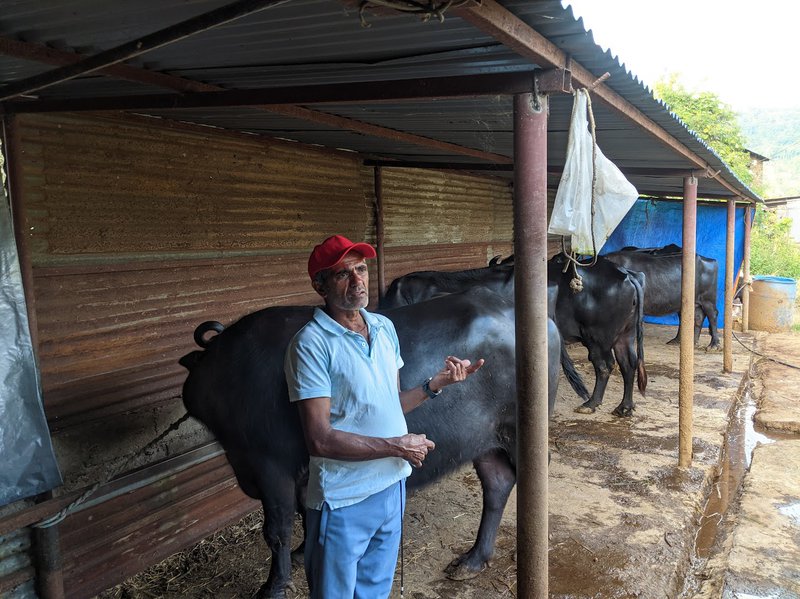
In light of this scenario, the experiences of Tamang, Shahi, Thapa, and Ghimire illustrate a potential solution. The initiative provides financial support for rural enterprises through SKBBL, formerly known as SFDB (SFAC). Additionally, the Rural Enterprise Financing Project (REFP) enhances the capabilities of SFDB and SFAC to fund rural enterprises, while also promoting value chain development and offering business facilitation assistance to smallholder farmers, with a particular focus on women.
The project aims to finance approximately 500 individual enterprises, including start-ups, with a target of at least 30% being initiated by women. This initiative will also aid in the reintegration of returning migrants. By offering value chain development and business facilitation support to these enterprises, especially those led by women, the project seeks to discourage men from pursuing employment opportunities abroad.
"We are committed to reaching out to smallholder farmers in need. Given that a majority of migrant workers come from this demographic, the project is poised to facilitate the reintegration of returning migrants as well," stated Dr. Navaraj Simkhada, Deputy Chief Executive Officer of SKBBL.
The project primarily benefits smallholder farmers who are affiliated with SFACs, enabling them to access microcredit facilities.
This initiative offers technical support to smallholder farmers aimed at fostering entrepreneurship and facilitating the establishment or enhancement of small businesses, with credit options reaching up to NPR 5 million. Additionally, the project aids in the formation of collective enterprises promoted by SFAC and/or its members, providing credit facilities of up to NPR 20 million.
Anjan Panday, Senior Program Officer at the ADB Nepal Resident Mission, noted that the REFP has developed credit products specifically designed to cultivate entrepreneurship among smallholder farmers involved in various agricultural activities. He emphasized that the project has successfully reached a significant number of marginalized and impoverished farmers.
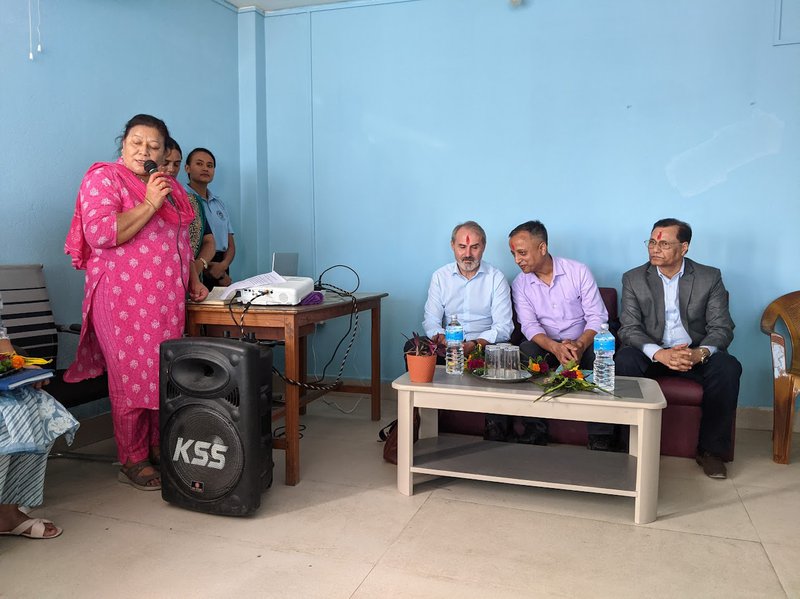
Research indicates that numerous impoverished families in rural Nepal opt to seek employment abroad due to low agricultural productivity, minimal returns from farming, scarce off-farm job opportunities, and inadequate credit access for small farmers.
Neelina Nakarmi, Economic Analyst at the ADB Nepal Resident Mission, remarked that the REFP has a substantial impact on enhancing the livelihoods of impoverished and marginalized farmers by boosting productivity and commercialization through strategic investments.
As the government of Nepal strives to reintegrate returnee migrants into their communities, the REFP's strategy of transitioning subsistence agriculture to a commercial model is a commendable approach to facilitate this reintegration.

Keshab Poudel
Poudel is the editor of New Spotlight Magazine.
- Nepal and India: More Cross Border Transmission line
- Feb 12, 2025
- MAHAKUMBH 2025 Festival Of The Century
- Feb 10, 2025
- The Question Arises: Do Former Prime Ministers Prachanda, Nepal, And Dr. Bhattarai Support The Terror actions Of Hamas?
- Dec 11, 2024
- MD KUL MAN GHISING: December 25 Deadline For Upper Tamakoshi
- Dec 09, 2024
- The Relationship Between Kosovo And Nepal Is Robust: ELBERT KRASNIQUI
- Nov 29, 2024
